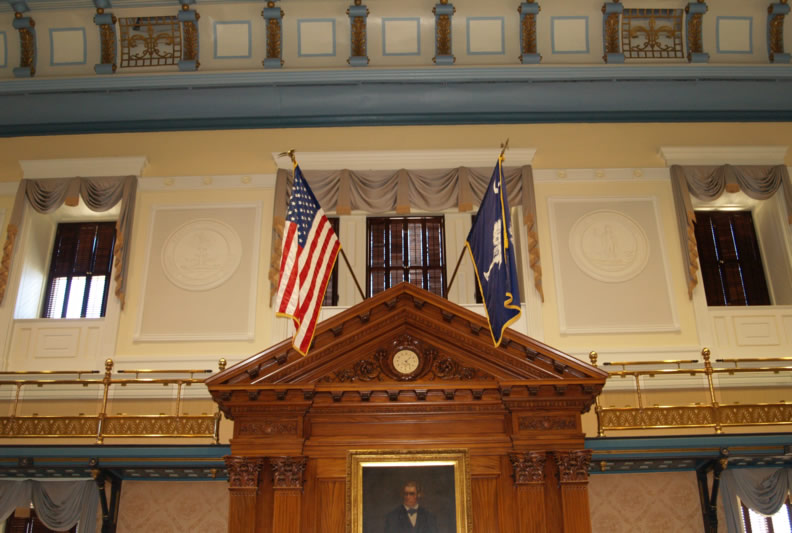
By Lindsay Street, Statehouse correspondent | As Democrats seek to flip four Senate seats in the Lowcountry in the Nov. 3 election, Republicans are looking to wrest five Democratic seats in reddening rural districts in the Upstate and Midlands.
 Of the Senate’s 46 seats, 27 currently are held by Republicans and 19 are held by Democrats. There are 32 seats facing a general election challenge in the Senate, but not all are competitive. As with the House races, changing demographics for the Charleston area and for rural parts of the state are the ingredients to making a competitive race.
Of the Senate’s 46 seats, 27 currently are held by Republicans and 19 are held by Democrats. There are 32 seats facing a general election challenge in the Senate, but not all are competitive. As with the House races, changing demographics for the Charleston area and for rural parts of the state are the ingredients to making a competitive race.
“Democrats could pick up four races in Charleston County, and if Democrats win four races in Charleston County, they would be looking at a tie (in the Senate),” Democratic strategist Tyler Jones of Charleston said, adding that a tie could benefit Democrats since not all Republicans vote along party lines. He said a tie would have big consequences in 2021, a redistricting year.
But getting to a tie will be hard since Republicans are looking to pick up five Democratic seats.
“No fear at all about losing the Senate at all,” South Carolina Republican Party Chair Drew McKissick said. “There are seats that are ripe for Republicans to win in this cycle in the Senate.”
McKissick said having President Donald Trump and U.S. Sen. Lindsey Graham at the top of the ticket as well as having a strong law-and-order message will create voter enthusiasm, which helps bring more people to the polls.
On the other side of the aisle, however, Democrats see an opportunity to attract voters amid health disparities and economic woes tied to the pandemic, and amid calls for policing reforms from minority communities.
Here are the nine state Senate races to watch in November, according to multiple political observers.
Senate District 10 (Greenwood)

Since taking office in 2008, Democratic Sen. Floyd Nicholson has fended off Republican challengers. This year, he faces another credible foe with Republican attorney Billy Garrett.
“We’ve got a great candidate out there,” McKissick said of Garrett.
In 2016, Floyd defeated his Republican challenger by fewer than 1,000 votes, or about 2.7 percentage points. Fundraising in the 2020 race for this seat has been close. As of July 10, Garrett reported $44,946 in individual contributions, and Nicholson reported $41,939.20.
Senate District 11 (Spartanburg)

Democratic Sen. Glenn Reese has been in office since 1990 and former Spartanburg County Republican Party Chair Josh Kimbrell is seeking to end his long tenure in November.
Changing demographics may create an opening for Republicans, McKissick said. New people moving into the district may not know Reese, he said.But Reese has a record of big wins. In 2016, Krispy Kreme franchise owner Reese defeated his Republican challenger by more than 9 percentage points. In 2012, he thumped his GOP opponent by more than 40 percentage points.
Reese has also raised nearly $3 for every $1 Kimbrell has raised, according to July 10 financial reports of individual contributions.
Jones said of Reese and Nicholson: “They’re always considered endangered but they always find a way to win.”
Senate District 20 (Columbia)

This race will be a rematch of a 2018 special election to fill the seat vacated by Republican John Courson. In that contest, Democratic candidate Dick Harpootlian won with fewer than 2,000 votes over Benjamin Dunn, or about 4.7 percentage points.
McKissick said the slim margin in a special election could spell trouble for Harpootlian going into a general election with the president and a U.S. senate seat on the ticket.
But fundraising isn’t at all tight in the race. According to the July 10 individual contributions, Harpootlian received $178,547.90 and Dunn received $3,560.
Senate District 22 (Blythewood)

Lee Blatt is looking to flip this Democratic stronghold outside of Columbia. Mia McLeod, first elected in 2016, could face an uphill climb in seeking her second term.
In her first general election, with an open seat, communications consultant McLeod defeated her Republican opponent by nearly 10 percentage points. Prior to McLeod, the seat had belonged to Democratic Sen. Joel Lourie since 2004.
Blatt, a former law enforcement officer and pilot, has raised $15,725 in individual contributions, according to the July 10 campaign report. McLeod raised $78,840.69.
Senate District 27 (Camden)
Jones called Democratic Sen. Vincent Sheheen’s battle to retain his seat in the general election “a relatively competitive race.”
Penry Gustafson, a Republican, is looking to unseat the Camden attorney, who was first elected in 2004. Sheheen hasn’t faced a Republican opponent since his first election.
In fundraising, the incumbent has the advantage. Sheheen reported $112,758.92 in individual contributions on July 10, whereas Gustafson reported $27,300.
Senate District 37 (Moncks Corner)

Republican Sen. Larry Grooms was first elected in a 1997 special election. Democratic challenger and communications professional Kathryn Whitaker is seeking to flip the seat.
Grooms was unopposed in the general elections in 2016 and 2012. Much of the district lies in Republican-territory of Berkeley County, which voted for Republican congressional candidate Katie Arrington over Democratic candidate Joe Cunningham in 2018.
Still, Grooms only has a slight edge with individual campaign contributions as of July 10 with $189,144.20. Whitaker reported $115,051.31.
Senate District 38 (Summerville)

Republican Sen. Sean Bennett won his Summerville seat and has maintained it since 2012 without a general election challenger. That will change in November with a Democratic bid from John Lowe, a Navy veteran who retired from Charleston County School District in 2019.
Like Berkeley County, Dorchester County — the majority of the district — also remains red despite the growing population outside Charleston. Financial planner Bennett has raised nearly $108 for every dollar Lowe has raised. According to July 10 campaign finance reports, Bennett reported $86,788.20 in contributions and Lowe reported $805 in contributions.
Senate District 41 (Charleston)

This race is one of the most talked about among senators and political observers. Even Republican Sen. Sandy Senn talked about her reelection chances on the Senate floor this month.
Senn, a lawyer, is being challenged by Democratic candidate Sam Skardon for this Charleston seat that helped give Cunningham his surprise 2018 win to Congress. Skardon, a former aide to the late U.S. Rep. John Lewis of Atlanta, has a background in community development financing organizations.
Individual contributions as of July 10 showed a tight race with Senn reporting $189,637.32, and Skardon reporting $174,167.
Senate District 43 (Charleston)

Republican Sen. Chip Campsen is seeking a fifth term for this seat that he has represented since 2004 when he defeated his Democratic opponent by nearly 9,000 votes. He hasn’t faced a Democratic challenger since. In November, he will face Mount Pleasant attorney Richard Hricik.
Attorney and businessman Campsen has championed conservation measures, which have earned him his tenure in the Charleston seat. But Hricik has countered Campsen’s long record in the Senate by saying voters deserve a candidate focused on many issues, such as education and health care — not just conservation.
According to the July 10 campaign reports, Hricik has received $138,414.20 in individual contributions, and Campsen has received $187,011.70 for this election.
Senate District 44 (Charleston)
With Republican Sen. Paul Campbell retiring this year, this Charleston-area Berkeley County seat is up for grabs. Campbell has held the seat since 2008 and never faced a general election challenger. But now, Democrats feel confident for a flip in a district that Cunningham won in 2018.
Democratic candidate Debbie Bryant, a former dean of nursing, is competing against retired North Charleston police officer Brian Adams, a Republican, for the seat.
One political observer noted Bryant having a fundraising advantage over Adams, who previously ran for Berkeley County Sheriff and won an election to Berkeley County School Board only to resign weeks later. In July, Adams reported $5,685 in contributions, while Bryant reported $56,709.44 in contributions.
- Have a comment? Send to: feedback@statehousereport.com



Thanks for an excellent summary.
(Jack Bass)
Pingback: South Carolina Could Reject a Record Number of Absentee Ballots – Radio Free
Pingback: South Carolina Could Reject a Record Number of Absentee Ballots - G20 Intel
Pingback: South Carolina Could Reject a Record Number of Ballots